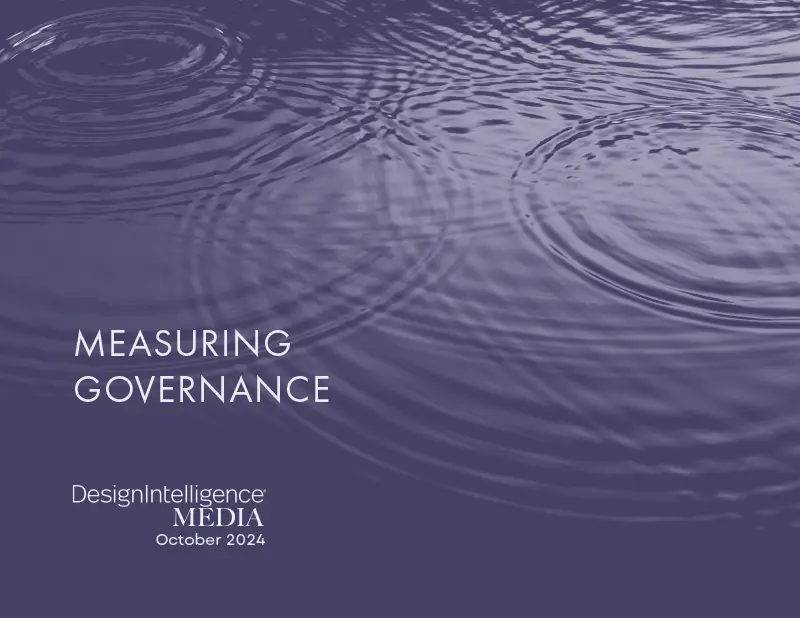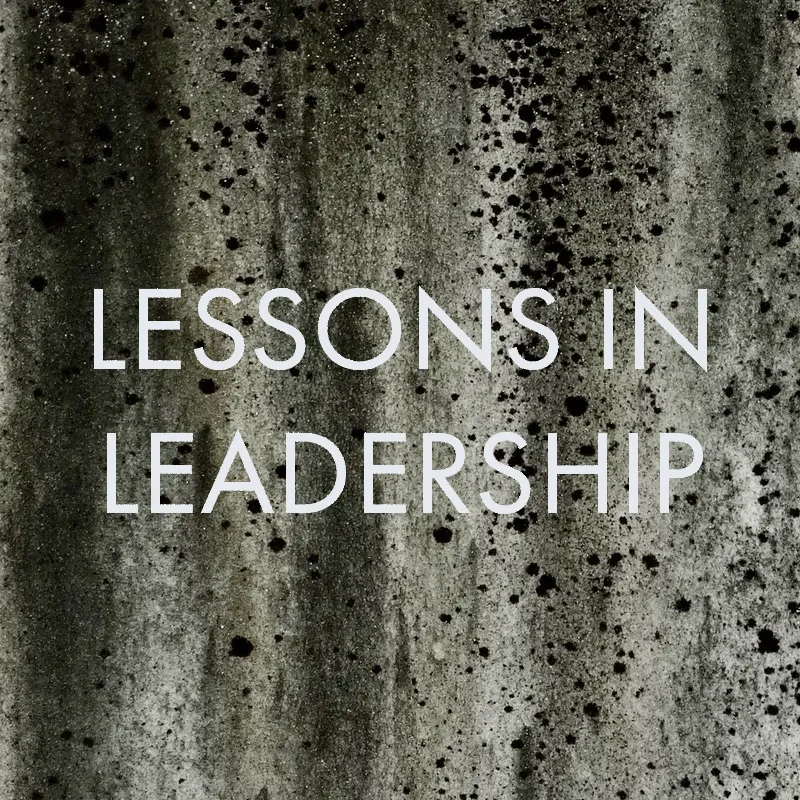
Measuring Governance
Bob Hughes
Design Futures Council Senior Fellow
October 23, 2024
What is the proper role for government in society and the economy? Bob Hughes steps outside his comfort zone to pose larger, more provocative, consequential and harder-to-quantify questions.
Throughout history, humans have gravitated toward community for safety, companionship and efficiency. As communities grew, the need for organization developed, along with the need (and desire) for a power structure. Power structures may be informal, reflecting the strengths and leadership characteristics of their members, or formal, with written rules such as those found in governments. As formal governments evolved, so did the question of their specific purpose and function. In the context of a polarized political climate and a national presidential election, the questions are more pertinent than ever: What is the proper role of a formal government in a civilized society, and how might we measure its effectiveness?
In the United States, the natural starting point for a discussion of government’s role in society is the Constitution. While most of its content is dedicated to the establishment and function of the government, its preamble provides a glimpse into the Founding Fathers’ intent, its purpose and goals:
We the People of the United States, in Order to form a more perfect Union, establish Justice, ensure domestic Tranquility, provide for the common defence, promote the general Welfare, and secure the Blessings of Liberty to ourselves and our Posterity, do ordain and establish this Constitution for the United States of America.
As with much of the Constitution, these carefully chosen words provide a framework and structure yet are vague enough to require interpretation and encourage thoughtful debate. The goals seem obvious enough: establish justice, ensure domestic tranquility, provide for the common defense, promote the general welfare and secure the blessing of liberty. The debate comes into play when we must decide how to achieve those broad goals.
A Dearth of Discussion
Unfortunately, the current-day political process leaves much to be desired in its ability to engage political leaders and the public in meaningful, useful discussion on how to achieve the broad goals enumerated by the Founding Fathers. The emergence of career politicians and massive quantities of money from lobbyists, political action committees and corporations are key reasons for the dysfunction, in my view, but that’s a topic for another time. Perhaps business leaders with their collective experiences running successful companies can fill the void. As business leaders know, well-run businesses usually have mission statements that outline broad goals for their firms, much like the Constitution’s preamble. But there’s a difference. Well-run businesses also have specific metrics by which success or failure may be measured. In truth, most businesses have many metrics:
- Financial statements (the foundation of the business sector) that track revenues, expenses, profits, assets, liabilities and net equity.
- Sales metrics.
- And human resources metrics, to name a few.
Such measurements are used across the globe to track and manage business activities in support of broad goals. While some are subject to interpretation, in general, their use helps achieve corporate goals and lessen the task of corporate governance.
What is the proper role of a formal government in a civilized society, and how might we measure its effectiveness?
Key Performance Indicators
Beyond these standard financial statements, the best-run businesses often have other important metrics to track trends and suggest adjustments. These are called key performance indicators or KPIs.
If you agree that government is necessary to achieve the broad goals established in the preamble, the consequential questions become:
- What should the government KPIs be?
- What tools (powers) should be permitted to achieve them?
The broad philosophical question of government’s proper role in society will thus be answered by the range and precision of the KPIs and by the acceptable powers used by the government to achieve them. What results can be seen as a cyclical discussion, but one we must face. With the presidential election cycle entering its final stage, now is an appropriate time to have this discussion.
Prerequisite Conditions
Assuming we are in search of key government indicators, two important conditions are required. The first is having open minds and the desire to engage in thoughtful debate. The willingness to listen, understand and accept other perspectives, and a disposition to compromise are the foundation of this condition. Sadly, our current political climate does not seem capable of supporting any of those critical conditions. Too much of the current campaign season is devoted to aggression, anger, hostility, mocking, lying, cheating and belittling. The proper role of government and appropriate KPIs will never be established without respectful, rational, thoughtful debate.
The second condition is understanding the nature and implications of different types of KPIs. A too broad KPI, being unquantifiable, will likely be unachievable. A too narrow or unrealistic KPI may be meaningless. For the government KPIs, the size and diversity of the population is an important consideration. To choose a KPI that is a single aggregate can be ineffective, while getting too granular may become unmanageable and of little use.
Examining Broad Goals — and Questions
Reconsider the broad goals in the Constitution’s preamble: justice, domestic tranquility, defense, general welfare and liberty. What would a proper KPI be for establishing justice? How about crime rates? Do we use national crime rates? Local crime rates? By age? Ethnicity? Birth status? Incarceration rates? Is justice more than just crime or incarceration? Should social justice be considered? How about business justice (e.g., enforceable contracts, copyright and patent protections)? What about domestic tranquility? We’ve had only one civil war (so far). That’s pretty good by any measure. Or is domestic tranquility better measured by surveys of individuals’ happiness? National defense is relatively easy to track. There have been no successful invasions to date, but the U.S. spends a tremendous amount for defense. Is the spending level justified? How about the general welfare? That’s a big issue and it’s getting bigger, becoming more relevant by the day, especially during the presidential campaign. Is gross domestic product good enough? As long as the economy expands, is the government achieving success? Who is measuring the effect of such expansion on climate, the planet and global warming? What about employment? Or inflation? Should income or wealth distribution be KPIs? Should education be provided to all? How much? What about health care? Clean air and water? Public goods and services, from roads, rail and airports to national parks? Is industrial policy, from trade policy including anti-dumping and tariffs, to support for critical industries like technology, energy and agriculture essential?
Finally, we have liberty. Is free speech an absolute? Has spreading lies, particularly for self-enrichment, become acceptable? What are our protections against defamation and libel? What about owning guns? Why not automatic weapons or weapons of mass destruction? Or drug use? These are all very real, relevant questions. Many are expressly stated as liberties guaranteed by the Constitution. Yet few, if any, specific KPIs (goals) exist to measure them. In today’s political climate, agreeing on answers to these questions seems like an impossibility, but it doesn’t have to be.
The Dual Mandate
While the federal government does not have widespread, established KPIs, the American people could benefit greatly from having thoughtful, reasonable, consensus ones. But at least one federal agency does: the Federal Reserve. The Fed has what’s commonly called a dual mandate: maximum employment and stable prices (with moderate interest rates sometimes added). Furthermore, the Fed, in concert with academics and Fed staff economists, have (mostly) agreed upon specific numerical targets:
- Price stability is inflation around 2% or less over time.
- Maximum employment (aka full employment) is around 3.5% to 4.0% unemployment.
Having these specific, stated goals means everyone knows what the Fed is trying to achieve. There will always be critics, but specific, stated goals mean that Fed policymakers can be held accountable. They can explain why decisions were made and how those decisions were consistent with the goals. The same accountability would be helpful if applied to the executive and legislative branches.
Business Leaders (and National Leadership)
With government dysfunction seemingly at an all-time high and society becoming more polarized, we business leaders may be the best hope for achieving our Founding Fathers’ broad goals as laid out in the preamble of the Constitution. Successful business leaders are skilled in establishing and achieving goals via KPIs. By leading a national discussion of practical and thoughtful perspectives about the role of government and appropriate metrics, they may be able to help bridge the widening gap between the political parties and their supporting societal segments. More importantly, by reviewing their own KPIs to ensure they focus on more than just profit, their businesses can consider the “general welfare” of their employees and the communities they touch.
In so doing, business leaders across the nation can lead by example and help America achieve the goals the Founding Fathers envisioned, at a time when government’s role and effectiveness is in doubt.
Let’s get to it.
Bob Hughes is a senior fellow of the Design Futures Council and writes regularly on economic matters.







